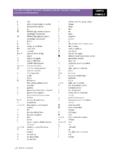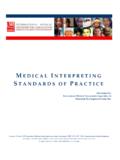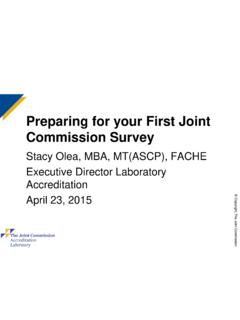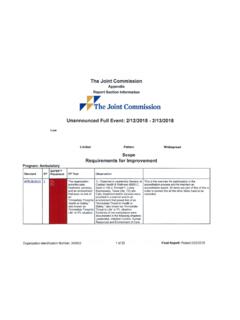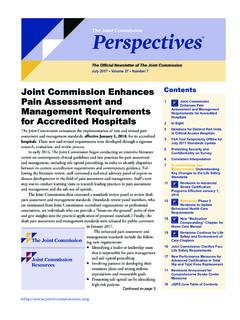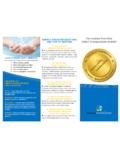Transcription of The Joint Commission s Contents Hospital Accreditation ...
1 The Joint Commission sHospital AccreditationRecognized by CMSThe Department of Health & Human Services Centers for Medicare andMedicaid Services (CMS) has approved the continuation of deeming authorityfor The Joint Commission s Hospital Accreditation program through July 15, CMS designation means that hospitals accredited by The JointCommission may choose to be deemed as meeting Medicare and Medicaid cer-tification requirements. CMS found that The Joint Commission s standards forhospitals meet or exceed those established by the Medicare and Medicaid pro-gram. CMS notice of the four-year approval was announced on November 27. The Joint Commission is proud of its tradition of collaboration with CMSto provide quality oversight of hospitals, says Mark Pelletier, , , execu-tive director, Accreditation and Certification Services, The Joint Commission . Accreditation is a proven method for improving the care of Medicare beneficiaries. Accreditation is voluntary, and seeking deemed status through accreditationis an option, not a requirement.
2 Hospitals seeking Medicare approval maychoose to be surveyed either by an accrediting body, such as The JointCommission, or by state surveyors onbehalf of CMS. All deemed status sur-veys are unannounced, a policy TheJoint Commission instituted in itsaccreditation process in Joint Commission s hospitalaccreditation program has held deemingauthority since the inception of theMedicare program in 1965. The JointCommission s Hospital accreditationprogram had previously been grantedunique statutory deeming authority;1 The Joint Commission s HospitalAccreditation Recognized byCMS2 In Sight2 ERRATA:Correction to JointCommission Launches Centerfor Transforming Healthcare 3 CLARIFICATION:RespiratoryCare Orders in Hospitals3 Joint Commission , HHS Team Upin Language Access EducationEffort4 New Process for DevelopingAccreditation survey Agenda4 Looking for a Few GoodSurveyors5 APPROVED:New andRevised Hospital EPs toImprove Patient-ProviderCommunication7 APPROVED:StaffingEffectivenessRequiremen ts for Hospitals andLong Term Care Organizations8 New Speak Up Coloring BookAbout Infection Control Available8 Free on the Web: Webinar onHealth Care AssociatedInfections9 The Joint Commission AppointsNew Directors9 Standards BoosterPak NowAvailable for The Joint Commission NamesNew Board Members11 NEW!
3 Pay Your Accreditation andCertification Fees Online11 Speak Up: How Patients CanMake the Most of a Visit to on page 112 Joint Commission PerspectivesJanuary 2010 Executive EditorAudrie Bretl Roelf, Project ManagerChristine Wyllie, , Accreditation ProductsDiane BellExecutive Director, PublicationsCatherine Chopp Hinckley, :The JointCommission Perspectives (ISSN 1044-4017) is published monthly (12 issues peryear) by Joint Commission Resources, 1515 West 22nd Street, Suite 1300W, OakBrook, IL 60523. Send address correctionsto Joint Commission Perspectives, SuperiorFulfillment, 131 W 1st Street, Duluth, MN55802-2065. Annual subscription rates for2010: United States, Canada, andMexico $319 for print and online, $299for online only. Rest of the world $410for print and online, $299 for online airmail add $25. Back issues are $25each (postage paid). Orders for 20-50 sin-gle/back copies receive a 20% discount.
4 Sitelicenses and multi-year subscriptions arealso available. To begin your subscription,call 800/746-6578, fax orders to 218/723-9437, or mail orders to Joint CommissionResources, 16442 Collections CenterDrive, Chicago, IL 60693. Direct allinquiries to Superior Fulfillment, 800 2010 Joint Commission onAccreditation of Healthcare OrganizationsNo part of this publication may be repro-duced or transmitted in any form or byany means without written Commission Resources, Inc. (JCR), anot-for-profit affiliate of The JointCommission, has been designated by TheJoint Commission to publish publicationsand multimedia products. JCR reproducesand distributes the materials under licensefrom The Joint Commission . The missionof The Joint Commission is to continuouslyimprove health care for the public, in col-laboration with other stakeholders, by eval-uating health care organizations and inspir-ing them to excel in providing safe andeffective care of the highest quality us on the Web column informs you of developments and potential revisions that can affect your accredita-tion and certification and tracks proposed changes before they are implemented.
5 Items may dropoff this list before the approval stage if they were rejected at some point in the COMMITTEE OR BOARD REVIEW Proposed standards on communication and culturally competent patient-centered carefor the hospitalprogram Proposed revisions to the staffing effectiveness requirements for the hospitaland longterm careprograms Proposed revisions to align with CMS rules for accrediting advanced imaging providersfor the ambulatory careprogram Revisions to Critical Access Hospitals with Rehabilitation and Psychiatric Distinct PartUnits to align with the Centers for Medicare and Medicaid Services requirements for thecritical access hospitalprogram, effective July 1, IN FIELD REVIEW Proposed revisions to National Patient Safety Goal 8 on medication reconciliation forthe ambulatory care, behavioral health care, critical access Hospital , home care, hos-pital, long term care, Medicare/Medicaid certification based long term care,andoffice-based surgeryprogramsCURRENTLY IN DEVELOPMENTSTANDARDS Proposed revisions to the Provision of Care, Treatment, or Services chapter for thebehavioral health careprogram.
6 Proposed revisions to National Patient Safety Goal 8 on medication reconciliation forthe ambulatory care, behavioral health care, critical access Hospital , home care, hos-pital, long term care, Medicare/Medicaid certification based long term care,andoffice-based surgeryprogramsJOINT Commission INTERNATIONALF ield review notifications are sent out electronically as well as posted on the Joint CommissionInternational (JCI) Web site at For JCI standards questions, please contact the associate director of Standards Development and Interpretation at International Clinical Care Program Certification Standards, 2nd edition (formerlyDisease- or Condition-Specific Care Certification)IN DEVELOPMENT International Accreditation Standards for Hospitals, 4th EditionINSIGHTERRATA:Correction to JointCommission Launches Center forTransforming Healthcare In the November 2009 issue, an article titled Joint Commission LaunchesCenter for Transforming Healthcare contained an error on page Healthcare was reported to be in Denver.
7 The organization isactually in Salt Lake City. We regret the error. PTwo Joint Commission elements ofperformance address respiratory care for hospitals that useJoint Commission Accreditation for deemed status pur-poses. The Centers for Medicare & Medicaid Services(CMS) requires a doctor of medicine or osteopathy todirect respiratory care services but does not limit theauthority of a doctor of medicine or osteopathy to delegatetasks to other qualified health care personnel to the extentrecognized under state law or a state s regulatory mecha-nism. Therefore, non-physician practitioners may write res-piratory care orders, provided it is within the scope of theirlicense. However, if a doctor of medicine or osteopathydelegates responsibility for writing orders to an eligiblenon-physician practitioner (such as a physician assistant ornurse practitioner), the responsible doctor of medicine orosteopathy must co-sign the , EP 7:For hospitals that use Joint Commissionaccreditation for deemed status purposes: A qualified doctorof medicine or osteopathy directs the following services: Anesthesia Nuclear medicine Respiratory , EP 14:For hospitals that use JointCommission Accreditation for deemed status purposes:Respiratory services are provided only on, and in accordancewith, the orders of a doctor of medicine or.
8 Respiratory CareOrders in HospitalsAmid growing concerns about racial, ethnic, and language dis-parities in health care, The Joint Commission and the of Health and Human Services (HHS) Office forCivil Rights have released a video titled Improving Patient-Provider Communication, which supports language access inhealth care organizations. The Joint Commission and HHSagree that effective communication is critical to safe, qualitypatient care. Many patients of varying circumstances requirealternative communication methods, and this new video willhelp health care organizations determine the best methods ofcare for meeting these communication many competing priorities in health care, the videoexplains why particular attention should be paid to federal civilrights standards and The Joint Commission s Accreditation stan-dards pertaining to effective communication and languageaccess. The video also addresses the obligations of health careorganizations with respect to the translation of written docu-ments.
9 The video clarifies that HHS and The Joint Commissiondo not endorse one specific approach to ensuring languageaccess, but recommend using resources and modes of interpre-tation that are accessible, in working order, and put into usewhen necessary to serve the needs of patients and their VI of the Civil Rights Act of 1964 prohibits discrimi-nation based on race, color, or national origin in programs thatreceive federal funds; a failure to provide language access servic-es for Limited English Proficient (LEP) persons may be a formof discrimination on the basis of national origin. Similarly,Section 504 of the Rehabilitation Act of 1973, which protectsthe rights of individuals with disabilities, requires health careorganizations that receive federal funds to provide effectivecommunication for patients who are deaf or hard of Americans with Disabilities Act requires the same stan-dards with respect to health care organizations without regardto their receipt of federal video streams from The Joint Commission sHospitals, Language, and Culture Web site at This page alsoincludes related resources from the Hospitals, Language andCulture: A Snapshot of the Nation study, a cross-sectional,qualitative study of how 60 hospitals across the country pro-vide health care to culturally and linguistically diverse patientpopulations, conducted by The Joint Commission with fund-ing from The California Endowment.
10 The video is also avail-able at the Office of Civil Rights (OCR) Web site The OCR Web page alsoincludes many resources on effective communication for LEPand deaf and hard-of-hearing persons. PJoint Commission , HHS Team Up inLanguage Access Education Joint Commission PerspectivesJanuary 2010 The Joint Commission , in its continued efforts to improvecustomer service, has implemented a new process for devel-oping the survey agenda. This new process ensures regularcommunication before survey between the Joint Commissionaccount executive and the health care organization to answerquestions and convey the future survey length and number ofsurveyors the survey , organizations will work with the sur-veyor(s) to determine the best time for scheduling surveyactivities so they coincide more effectively with patient careand administrative operations. The agreed-upon agenda willbe used throughout the survey to ensure the following: Consistency so that all required activities occur duringthe survey Coordination and communication so all parties thehealth care organization as well as the surveyors areaware of the timing of survey activities Collaboration so that survey activities occur at a timethat meets the needs of the organization and its in 2010, the revised process will consist of thefollowing The Joint Commission will send an e-mail to theorganization to confirm the program(s) to be surveyedper the organization s recently submitted e-Applicationdata and direct the organization to its The JointCommission Connect extranet page for additionalinformation.
